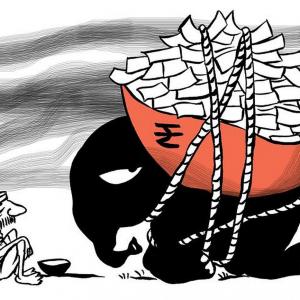Industry players believe the new DFI model will be initially risk capital, which will then be used to mobilise additional resources from development agencies such as World Bank.

The government is likely to unveil the structure and final model of the new, large development financial institution (DFI) in the upcoming Union Budget, scheduled to be presented on February 1.
Further, it might reveal some more measures to provide easier access to infrastructure financing to aid economic growth.
According to sources, the final draft of the framework, which is being prepared, will have specific mandates for the new entity, along with shareholding and finance structure for specific sectors.
“The new entity will be different and have greater risk-appetite than the existing institutions for infrastructure financing.
"The emphasis is to create a model that is more sector-specialised and flexible in terms of long-term financing,” said a government source.
The final framework will bear details of government shareholding, or if it will be constituted through a statute, he added.
Given the current need to push infrastructure-led growth, India needs more than one or preferably two government-backed DFIs, he said.
The proposed DFI is expected to be partially owned by the government.
The government is also looking at subsuming a smaller non-banking financial company India Infrastructure Finance Company with the new DFI.
It is also learnt that the new entity will essentially be given the mandate to fund large rural infrastructure projects and ones banks and other lenders are wary of funding due to a long gestation period, said another person privy to the discussion.
At present, there are a few of financial institutions, such as Indian Railway Finance Corporation, National Bank for Agriculture and Rural Development, and Small Industries Development Bank of India, which fund infrastructure projects.
They can’t give practical solutions, particularly in the context of asset-liability mismatches faced by creditors, feel experts.
“DFIs can help on two fronts: one, the cost of funds will be lower. Two, they will be backed by longer tenure liabilities.
"Since it will have government back-up, it will specifically pick up capital in the initial stages of the infrastructure project rather than wait for final approval of the project at a later stage. Typically, problems crop up in the initial stages of a project.
"That is why the role of DFIs is critical,” said Arindam Guha, partner-infrastructure and public sector, Deloitte India.
Industry players believe the new DFI model will be initially risk capital, which will then be used to mobilise additional resources from development agencies such as World Bank, stepping in to co-fund the DFI.
On the other hand, pension and sovereign wealth funds, too, will contribute in terms of investment, which will help the DFI tap international capital markets with debt instruments.
“The DFI’s competency is to ensure projects are appraised properly, and only the right ones are picked up, where transaction and project structuring reflect the sector cash flow and risk profile,” added Guha.
Further, the government may also announce some steps to revamp the bond market to finance infrastructure projects at a time when the government expects its Rs 111-trillion National Infrastructure Pipeline to cushion the blow to the economy by boosting investment.
These steps will be aimed at providing greater sources of funds for project and infrastructure financing, along with a DFI.
There is a need for more steps to open more sources for infrastructure financing, said a sourced quoted earlier.
India needs a DFI since infrastructure financing needs patient capital, and banks are currently not suited to lend for long-term projects which do not generate any cash in the initial years, Financial Services secretary Debasish Panda had told Business Standard last month.
He had called such an institution a ‘catalyst’ for funding and enhancing the credit rating of projects.
Photograph: Anushree Fadnavis/Reuters










